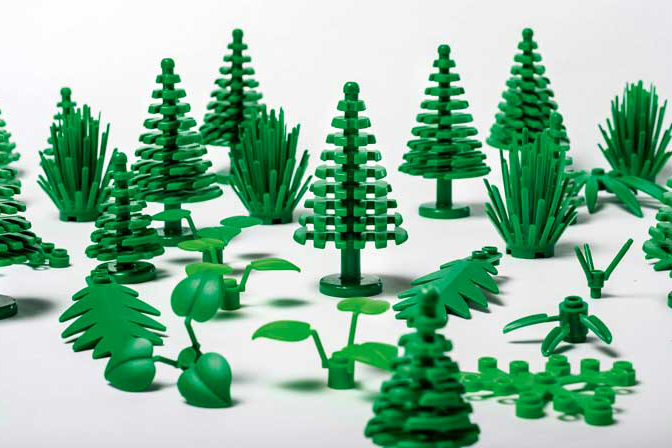
Those building blocks you just love to step on in the middle of the night are about to reduce their impact on the environment. Lego announced that its leaves, bushes, and trees pieces will be made from a plant-based plastic sourced from sugarcane. They will make their first appearance in Lego sets as early as this year. Production has already begun on the sustainable elements.
“At the Lego Group, we want to make a positive impact on the world around us, and are working hard to make great play products for children using sustainable materials,” Tim Brooks, vice president of environmental responsibility at the Lego Group, said. “This is a great first step in our ambitious commitment of making all Lego bricks using sustainable materials.”
The greener green Lego elements are being made from polyethylene, a plastic that is both soft and durable. Lego purists need not worry about a difference in quality or feel, as the Danish toy maker says that the new pieces are “technically identical to those produced using conventional plastic.” The plant-based plastic has been tested to meet Lego’s standards for safety.
“Lego products have always been about providing high-quality play experiences, giving every child the chance to shape their own world through inventive play. Children and parents will not notice any difference in the quality or appearance of the new elements, because plant-based polyethylene has the same properties as conventional polyethylene,” Brooks said.
The Lego Group partnered with the World Wide Fund for Nature (WWF) and the Bioplastic Feedstock Alliance (BFA) to support sustainably and responsibly sourced plastic and raw material for the bioplastics industry. Lego’s new plant-based plastic is certified by the Bonsucro Chain of Custody for responsibly sourced sugarcane.
Polyethylene elements will amount to 1 to 2 percent of the total plastic used by Lego. For the most part, other pieces will still be made of acrylonitrile butadiene styrene (ABS), an oil-based plastic.
Lego has committed to using sustainable materials in “core products and packaging” by 2030. It is aiming for zero waste in the company’s operations, and will introduce sustainable paper pulp trays for the Lego advent calendar sets, which will reduce the amount of plastic waste going to landfills.


